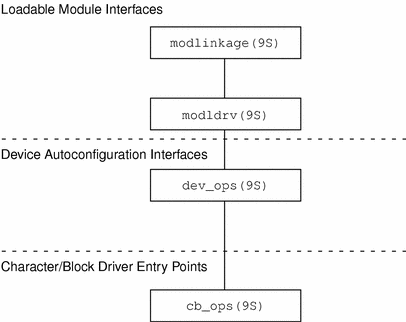Driver Module Entry Points
Each device driver defines a standard set of functions called entry points, which are listed in Intro(9E). These entry points are called by the Solaris kernel to load and unload the driver, autoconfigure devices, and provide the character, block, or STREAMS driver I/O services. Drivers for different types of devices have different sets of entry points according to the kinds of operations the devices perform. A driver for a memory-mapped character-oriented device, for example, supports a devmap(9E) entry point, while a block driver does not.
Figure 2-1 Device Driver Overview

Some operations are common to all drivers, such as the functions that are required for module loading (_init(9E), _info(9E), and _fini(9E)), and the required autoconfiguration entry points attach(9E), detach(9E), and getinfo(9E). Drivers also support the optional autoconfiguration entry point for probe(9E). Most leaf drivers have open(9E) and close(9E) entry points to control access to their devices.
Traditionally, all driver function and variable names have some prefix added to them. Usually this is the name of the driver, such as xxopen() for the open(9E) routine of driver xx. In subsequent examples, xx is used as the driver prefix.
Note -
In the Solaris 8 operating environment, only the loadable module routines must be visible outside the driver object module. Other routines can have the storage class static.
Loadable Module Entry Points
All drivers are required to implement the loadable module entry points _init(9E), _fini(9E), and _info(9E) entry points to load, unload, and report information about the driver module.
It is recommended that drivers allocate and initialize any global resources in _init(9E) and release their resources in _fini(9E).
Autoconfiguration Entry Points
Drivers are required to implement the attach(9e), detach(9e), and getinfo(9e) entry points for device autoconfiguration. Drivers might need to implement probe(9e) if the driver supports devices that are not self identifying, such as SCSI target devices.
Character and Block Driver Entry Points
Drivers for character and block devices export a cb_ops(9S) structure, which defines the driver entry points for block device access and character device access. Both types of drivers are required to support open(9E) and close(9E). Block drivers are required to support strategy(9E), while character drivers can choose to implement whatever mix of read(9E), write(9E), ioctl(9E), mmap(9E), ordevmap(9E) entry points as appropriate for the type of device. Character drivers can also support a polling interface through chpoll(9E), as well as asynchronous I/O through aread(9E) and awrite(9E).
For information on character driver entry points, see Chapter 10, Drivers for Character Devices. For information on block driver entry points, see Chapter 11, Drivers for Block Devices.
Power Management Entry Point
Drivers for hardware devices that provide Power Management functionality can support the optional power(9E) entry point. See Chapter 9, Power Management for details about this entry point.
- © 2010, Oracle Corporation and/or its affiliates
